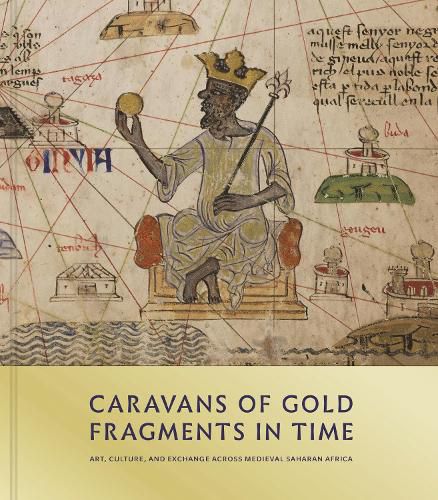Readings Newsletter
Become a Readings Member to make your shopping experience even easier.
Sign in or sign up for free!
You’re not far away from qualifying for FREE standard shipping within Australia
You’ve qualified for FREE standard shipping within Australia
The cart is loading…






How West African gold and trade across the Sahara were central to the medieval world
The Sahara Desert was a thriving crossroads of exchange for West Africa, North Africa, the Middle East, and Europe in the medieval period. Fueling this exchange was West African gold, prized for its purity and used for minting currencies and adorning luxury objects such as jewelry, textiles, and religious objects. Caravans made the arduous journey by camel southward across the Sahara carrying goods for trade-glass vessels and beads, glazed ceramics, copper, books, and foodstuffs, including salt, which was obtained in the middle of the desert. Northward, the journey brought not only gold but also ivory, animal hides and leatherwork, spices, and captives from West Africa forced into slavery.
Caravans of Gold, Fragments in Time draws on the latest archaeological discoveries and art historical research to construct a compelling look at medieval trans-Saharan exchange and its legacy. Contributors from diverse disciplines present case studies that form a rich portrayal of a distant time. Topics include descriptions of key medieval cities around the Sahara; networks of exchange that contributed to the circulation of gold, copper, and ivory and their associated art forms; and medieval glass bead production in West Africa’s forest region. The volume also reflects on Morocco’s Gnawa material culture, associated with descendants of West African slaves, and movements of people across the Sahara today.
Featuring a wealth of color images, this fascinating book demonstrates how the rootedness of place, culture, and tradition is closely tied to the circulation of people, objects, and ideas. These fragments in time offer irrefutable evidence of the key role that Africa played in medieval history and promote a new understanding of the past and the present.
Published in association with the Mary and Leigh Block Museum of Art, Northwestern University
Exhibition Schedule Block Museum of Art, Northwestern University January 26-July 21, 2019
Aga Khan Museum, Toronto September 21, 2019-February 23, 2020
Smithsonian National Museum of African Art, Washington, DC April 8-November 29, 2020
$9.00 standard shipping within Australia
FREE standard shipping within Australia for orders over $100.00
Express & International shipping calculated at checkout
How West African gold and trade across the Sahara were central to the medieval world
The Sahara Desert was a thriving crossroads of exchange for West Africa, North Africa, the Middle East, and Europe in the medieval period. Fueling this exchange was West African gold, prized for its purity and used for minting currencies and adorning luxury objects such as jewelry, textiles, and religious objects. Caravans made the arduous journey by camel southward across the Sahara carrying goods for trade-glass vessels and beads, glazed ceramics, copper, books, and foodstuffs, including salt, which was obtained in the middle of the desert. Northward, the journey brought not only gold but also ivory, animal hides and leatherwork, spices, and captives from West Africa forced into slavery.
Caravans of Gold, Fragments in Time draws on the latest archaeological discoveries and art historical research to construct a compelling look at medieval trans-Saharan exchange and its legacy. Contributors from diverse disciplines present case studies that form a rich portrayal of a distant time. Topics include descriptions of key medieval cities around the Sahara; networks of exchange that contributed to the circulation of gold, copper, and ivory and their associated art forms; and medieval glass bead production in West Africa’s forest region. The volume also reflects on Morocco’s Gnawa material culture, associated with descendants of West African slaves, and movements of people across the Sahara today.
Featuring a wealth of color images, this fascinating book demonstrates how the rootedness of place, culture, and tradition is closely tied to the circulation of people, objects, and ideas. These fragments in time offer irrefutable evidence of the key role that Africa played in medieval history and promote a new understanding of the past and the present.
Published in association with the Mary and Leigh Block Museum of Art, Northwestern University
Exhibition Schedule Block Museum of Art, Northwestern University January 26-July 21, 2019
Aga Khan Museum, Toronto September 21, 2019-February 23, 2020
Smithsonian National Museum of African Art, Washington, DC April 8-November 29, 2020